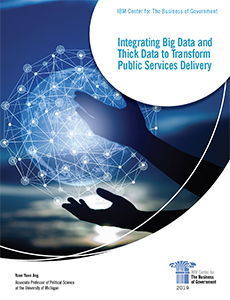
Integrating Big Data and Thick Data to Transform Public Services Delivery

Governments can greatly enhance the value of big data by combining it with “thick” data—rich qualitative information about users, such as their values, goals, and consumption behavior, obtained by observing or interacting with them in their daily lives. Big data holds great promise for improving public services delivery and innovation in government, but they are not a panacea . Having lots of data can be overwhelming or have little utility if the data are “thin”—that is, they lack meaning for users or fail to capture issues that matter most . By yielding insights into what citizens really care about and how they consume services, thick data can inform both the collection and analysis of big data.
This report introduces the concept of “mixed analytics,” integrating big data and thick data to transform government decision making, public services delivery, and communication. The report presents three case studies of organizations that employ mixed analytics at the international, federal, and city level, respectively. Together, this research offers a set of transferable lessons for agencies at all levels of government:
- Lesson 1: Big data is a means to an end, rather than an end.
- Lesson 2: Thick data can identify unexpected problems or previously unexpressed needs.
- Lesson 3: Thick data can inform the analysis of big data.
- Lesson 4: Mixed analytics can offer both scale and depth.
- Lesson 5: Applying technology is a social activity, not an isolated technical task.
- Lesson 6: The best solutions are not always high-tech.
The report concludes with five actionable recommendations for public managers.
- Make data and technology relevant to the people who use it.
- Leverage thick data at appropriate stages of the problem-solving process.
- Build an interdisciplinary team of quantitative and qualitative experts who work closely with stakeholders.
- Combine big and thick data to improve communication
- Improve government agencies’ knowledge of mixed research methods.
This report builds on multiple past IBM Center reports about how government can leverage data and analytics to improve decisions, including Data-Driven Government: The Role of Chief Data Officers, by Jane Wiseman; Ten Actions to Implement Big Data Initiatives: A Study of 65 Cities, by Alfred Ho and Bo McCall, and Realizing The Promise of Big Data, by Kevin DeSouza. The report also complements several chapters that assess the past and potential use of data across the public sector in our recent book, Government For The Future: Reflection and Vision For Tomorrow’s Leaders.
At a time when the US and other governments continue to enhance their use of data as a strategic asset for transformation, we hope that Professor Ang’s report provides useful insights for government managers and stakeholders.



